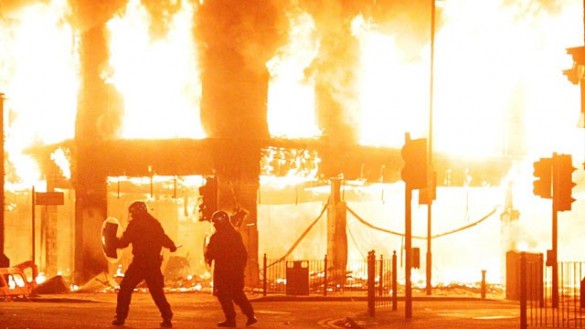
On April 20th, 1968, Enoch Powell, a member of the British Parliament, gave a speech to a gathering of Conservative Party leadership in which he attacked the British government’s policy of mass immigration and multiculturalism. Powell was prompted to this action by the introduction of the Race Relations Act 1968 which would make “it illegal to refuse housing, employment, or public services to a person on the grounds of colour, race, ethnic or national origins.”1 Powell correctly saw that, far from promoting “harmonious community relations” as the bill claimed, this would merely force the British people to allow their neighborhoods to be turned into crime-ridden slums. The speech has come to be known as the “Rivers of Blood” speech due to Powell’s quotation of the Roman poet Virgil: he was “filled with foreboding; like the Roman, I seem to see ‘the River Tiber foaming with much blood'”2 if Britain did not change the course she was set upon. The British media was present during the speech and their denunciations of his “racism” were immediate, the Times even going so far as to call it “an evil speech.”3 The political establishment joined in the attack, and Powell lost his position in the British government the next day. Much of the British public rallied to Powell’s message, however, and his speech is credited with the Conservative Party’s victory in the 1970 elections.4 Despite the massive attacks leveled at him, Powell never apologized or took back his statements made in the Rivers of Blood. The ending line of the speech – “all I know is that to see, and not to speak, would be the great betrayal” – has been a great inspiration to me personally.
You can read the speech in its entirety here, but if you just want the more important parts of the speech, below are some excerpts:
The supreme function of statesmanship is to provide against preventable evils. In seeking to do so, it encounters obstacles which are deeply rooted in human nature.
One is that by the very order of things such evils are not demonstrable until they have occurred: at each stage in their onset there is room for doubt and for dispute whether they be real or imaginary. By the same token, they attract little attention in comparison with current troubles, which are both indisputable and pressing: whence the besetting temptation of all politics to concern itself with the immediate present at the expense of the future.
Above all, people are disposed to mistake predicting troubles for causing troubles and even for desiring troubles: “If only,” they love to think, “if only people wouldn’t talk about it, it probably wouldn’t happen.” . . .
At all events, the discussion of future grave but, with effort now, avoidable evils is the most unpopular and at the same time the most necessary occupation for the politician. Those who knowingly shirk it deserve, and not infrequently receive, the curses of those who come after. . . .
It almost passes belief that at this moment 20 or 30 additional immigrant children are arriving from overseas in Wolverhampton alone every week – and that means 15 or 20 additional families a decade or two hence. Those whom the gods wish to destroy, they first make mad. We must be mad, literally mad, as a nation to be permitting the annual inflow of some 50,000 dependants, who are for the most part the material of the future growth of the immigrant-descended population. It is like watching a nation busily engaged in heaping up its own funeral pyre. So insane are we that we actually permit unmarried persons to immigrate for the purpose of founding a family with spouses and fiancés whom they have never seen. . . .
[Ethnic Britons] found their wives unable to obtain hospital beds in childbirth, their children unable to obtain school places, their homes and neighbourhoods changed beyond recognition, their plans and prospects for the future defeated; at work they found that employers hesitated to apply to the immigrant worker the standards of discipline and competence required of the native-born worker; they began to hear, as time went by, more and more voices which told them that they were now the unwanted. They now learn that a one-way privilege is to be established by act of parliament (the Race Relations Act 1968); a law which cannot, and is not intended to, operate to protect them or redress their grievances is to be enacted to give the stranger, the disgruntled and the agent-provocateur the power to pillory them for their private actions. . . .I am going to allow just one of those hundreds of [ethnic British] to speak for me:
“Eight years ago in a respectable street in Wolverhampton a house was sold to a Negro. Now only one white (a woman old-age pensioner) lives there. This is her story. She lost her husband and both her sons in the war. So she turned her seven-roomed house, her only asset, into a boarding house. She worked hard and did well, paid off her mortgage and began to put something by for her old age. Then the immigrants moved in. With growing fear, she saw one house after another taken over. The quiet street became a place of noise and confusion. Regretfully, her white tenants moved out.
“The day after the last one left, she was awakened at 7am by two Negroes who wanted to use her phone to contact their employer. When she refused, as she would have refused any stranger at such an hour, she was abused and feared she would have been attacked but for the chain on her door. Immigrant families have tried to rent rooms in her house, but she always refused. Her little store of money went, and after paying rates, she has less than £2 per week. She went to apply for a rate reduction and was seen by a young girl, who on hearing she had a seven-roomed house, suggested she should let part of it. When she said the only people she could get were Negroes, the girl said, ‘Racial prejudice won’t get you anywhere in this country.’ So she went home.
“The telephone is her lifeline. Her family pay the bill, and help her out as best they can. Immigrants have offered to buy her house – at a price which the prospective landlord would be able to recover from his tenants in weeks, or at most a few months. She is becoming afraid to go out. Windows are broken. She finds excreta pushed through her letter box. When she goes to the shops, she is followed by children, charming, wide-grinning piccaninnies. They cannot speak English, but one word they know. “Racialist,” they chant. When the new Race Relations Bill is passed, this woman is convinced she will go to prison. And is she so wrong? I begin to wonder.” . . .
‘The Sikh communities’ campaign to maintain customs inappropriate in Britain is much to be regretted. Working in Britain, particularly in the public services, they should be prepared to accept the terms and conditions of their employment. To claim special communal rights (or should one say rites?) leads to a dangerous fragmentation within society. This communalism is a canker; whether practised by one colour or another it is to be strongly condemned. . . .
For these dangerous and divisive elements the legislation proposed in the Race Relations Bill is the very pabulum they need to flourish. Here is the means of showing that the immigrant communities can organise to consolidate their members, to agitate and campaign against their fellow citizens, and to overawe and dominate the rest with the legal weapons which the ignorant and the ill-informed have provided. As I look ahead, I am filled with foreboding; like the Roman, I seem to see “the River Tiber foaming with much blood.” . . .
Only resolute and urgent action will avert it even now. Whether there will be the public will to demand and obtain that action, I do not know. All I know is that to see, and not to speak, would be the great betrayal.
Enoch Powell was ignored, and over the next forty-three years the non-white population of United Kingdom rapidly increased until in 2009, almost 6.5 million non-whites lived in the United Kingdom, comprising over 10% of the population. These non-whites are concentrated in the cities; London is currently over 30% non-white and well on its way to becoming a majority non-white city. London is currently paying the price for ignoring Enoch Powell’s warning and embracing the enrichment of diversity and multiculturalism.

On August 4, 2011, police shot and killed a black man by the name of Mark Duggan during an attempted arrest in Tottenham, a non-white area of North London. Duggan was a member of a street gang and was wanted in regards to drug- and gun-related crimes. He was armed when he was shot by police, and reports even indicated that he exchanged fire with the police. However, the black community staged a protest march on August 6 which, as is typical with such gatherings, quickly turned violent and then riotous. The rioting has rapidly grown and spread to other cities with black populations like Birmingham, Liverpool, Nottingham, Bristol, Kent and Leeds.5 Whole areas of London are in a state of anarchy where hundreds of building have been burned, hundreds of shops looted, and dozens injured. Hundreds of rioters have been arrested, but due to the sheer number of the rioters, the police have been unsuccessful in their attempts to reestablish order. Anther hindrance is the race of the rioters. For years the police have been hammered with sensitivity training and hamstrung with endless regulations in their dealings with minorities. This is now coming back to bite them. As the UK Telegraph put it, “the police have become so sensitive to the issue of race that it is impairing their ability to do the job.”6
The media has been very careful to label the rioters as “youths”, but that’s just a politically correct codeword for misbehaving blacks, Arabs, and Asians – just like the violence in Paris was done by “youths,” the violent and thieving flash mobs in America were “youths,” and the Memorial Day violence this year was done by “youths.” The rioters in London and elsewhere are not exclusively non-white, as there are opportunistic elements in all societies, yet the vast majority of them are blacks lashing out at the Western society that they hate, despite all the benefits and handouts they have received from it.7
Enoch was right: London is burning, and the TiberThames may well foam with blood before this situation is dealt with.
Footnotes
- http://en.wikipedia.org/wiki/Race_Relations_Act_1968 ↩
- http://www.telegraph.co.uk/comment/3643823/Enoch-Powells-Rivers-of-Blood-speech.html ↩
- http://en.wikipedia.org/wiki/Enoch_Powell#cite_note-81 ↩
- http://en.wikipedia.org/wiki/Enoch_Powell#cite_note-Heffer.2C_p._568-2 ↩
- http://www.bbc.co.uk/news/uk-england-14457535 ↩
- http://www.telegraph.co.uk/news/uknews/crime/8689004/London-riots-why-did-the-police-lose-control.html ↩
- http://www.youtube.com/watch?v=53XnvNOR5EU ↩
| Tweet |
|
|
|




